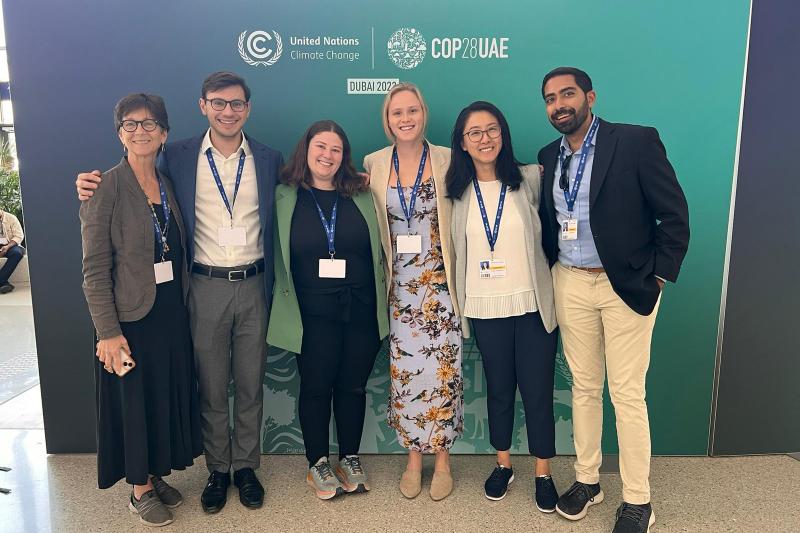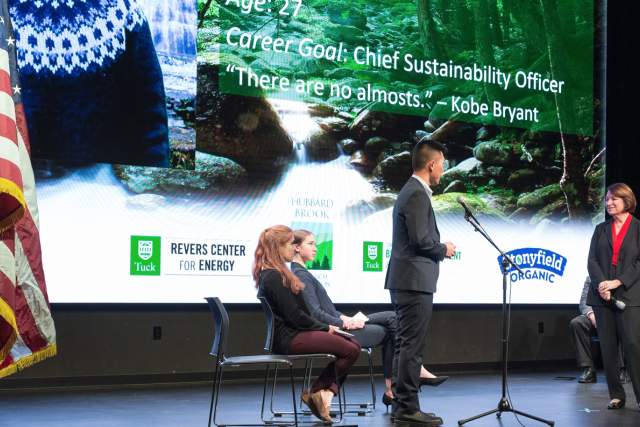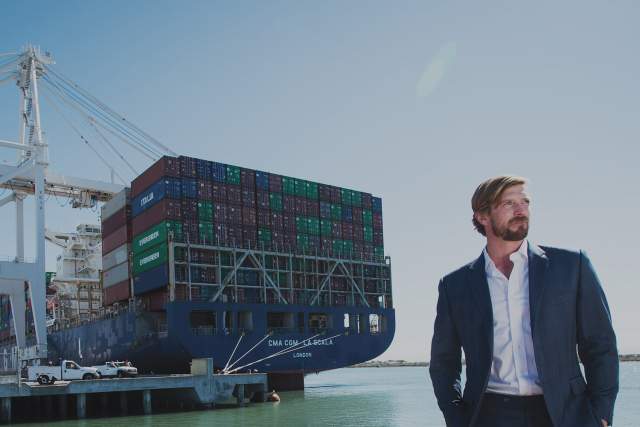Ten students traveled to Dubai for COP28 in November where they had credentialed observer status—granting them access to innovative ideas, formal presentations, and high-stakes negotiations focused on combating the growing impact of climate change.
Tuck sent its first student delegation to COP, also known as the United Nations Climate Change Conference, in 2009. Co-sponsored by Tuck’s Center for Business, Government & Society (CBGS) and the Revers Center for Energy, Sustainability and Innovation (RCESI), the experience is one of many offered by Tuck that expose MBA students to complex global issues. Throughout the year, the centers also arrange site visits and treks, host alumni and guest speakers, and facilitate workshops and information sessions on topics ranging from energy finance and carbon markets to corporate purpose and social impact.
For T’24 Laura Betten, a second-year MBA student who, before Tuck, spent two years as a Peace Corps volunteer in Senegal and four years at a social impact-driven consulting firm, COP offered the opportunity to hear directly from different stakeholders about the full scope of climate challenges they are facing.
Betten acknowledges that progress around the climate crisis can often seem slow, particularly as the world confronts an increasing number of severe climate-related weather events, including record heat waves, droughts, flooding, and forest fires. But hearing directly from stakeholders made her appreciate the hard-won progress that has been made.
“Being there helped me recognize the need to celebrate the wins because that’s an important part of keeping people energized to see the work through,” says Betten. “At the same time, we can’t be complacent.”
You get to see how nations are responding to the voices of stakeholders—not just governments, but also civil and private organizations, indigenous groups, and young people. COP is a prime example of government, business, and society coming together to support the common good.
— Laura Betten T’24
Mitigating Climate Impacts on Food Systems
Betten arrived at COP28 interested in learning more about global food systems and their relationship to the climate crisis. She was thrilled to learn that more than 150 countries signed the “COP28 Declaration on Sustainable Agriculture, Resilient Food Systems, and Climate Action.” The declaration outlines a range of commitments by 2025 intended to promote food security and mitigate the harmful effects of climate change on agriculture and food systems.
Witnessing sovereign nations come together at this scale is a big part of what makes COP such a valuable learning opportunity, says Hannah Payson, executive director of CBGS.
“You get to see how nations are responding to the voices of stakeholders—not just governments, but also civil and private organizations, indigenous groups, and young people,” she says. “COP is a prime example of government, business, and society coming together to support the common good.”
Assessing the Global Climate Action Portal (GCAP)
While heads of state continue to play a key role in addressing climate change, there is growing recognition that commitments made by non-government actors are also important and deserving of attention.
The Global Climate Action Portal (GCAP) is an online tool designed to aggregate and track climate pledges from these organizations, which include nonprofits, investors, businesses, and research organizations. During COP28, Tracy Bach, a long-time climate change law and policy analyst, advised students in a formal, for-credit independent study project (ISP) to research the efficacy of GCAP and assess whether the tool is successfully holding organizations accountable to their climate commitments.
“The issue of ‘greenwashing,’ or organizations overstating their commitments to environmental action, is something the conference has been working to address,” says Bach. “GCAP is trying to up the ante for transparency and ensure there is a plan and follow-through on climate pledges.”

Students conducted an independent study project (ISP) to research the efficacy of the Global Climate Action Portal (GCAP) and assess whether the tool is successfully holding organizations accountable to their climate commitments.
Students were divided into different workstreams to complete the ISP. For their part, T’24s Jack Vann and Sarah Kilpatrick conducted primary research and attended feedback sessions to ensure their recommendations appropriately addressed stakeholders’ concerns.
“We were trying to understand what the conversation about GCAP has been and where it sits currently,” says Vann, who previously worked in corporate strategy for the Fortune 500 health insurance provider Humana. “This required listening to what the different stakeholder groups had to say, identifying the biggest pain points, and brainstorming solutions.”
Other workstreams looked at the history of the portal as well as the technology and data that support it. The group’s research was then synthesized into a formal submission for the U.N. to consider, outlining several recommendations to improve the timeliness and accuracy of data reporting as well as the technical functionality of the portal.
Reflecting on the impact of her COP28 experience, Kilpatrick is excited to integrate more of a climate and sustainability focus into her post-Tuck career in health care consulting.
“Regardless of what industry or business you are in, we all have a part to play in building toward a more sustainable future,” she says.
Companies are actively seeking out students with the skills and interests to help them navigate rapid developments in technology, policy, and consumer demand. … I can’t imagine an institution better equipped to bring together that breadth of expertise in business, policy, engineering, and applied sciences.
— Jonathan Silverthorne D’08, Director, Revers Center for Energy, Sustainability & Innovation
Growing Demand for MBAs Interested in Energy and Sustainability
RCESI Director Jonathan Silverthorne D’08 agrees, adding that opportunity abounds for students willing to dig in and address the energy and sustainability challenges businesses are facing.
“It’s an exciting moment to build a career in energy and climate-related fields,” says Silverthorne. “Companies are actively seeking out students with the skills and interests to help them navigate rapid developments in technology, policy, and consumer demand.”
In recent months, RCESI led site visits to companies at the cutting edge of the clean energy transition, including BETA Technologies, a Burlington, VT-based electric aircraft manufacturer, and KORE Power, a leading U.S.-based developer of battery cell technology.
Financing is key to the energy transition, and with trillions of dollars being invested in clean tech companies like these, RCESI and T’24 Claire Kadeethum ran the Tuck Renewable Energy Finance Case Competition in February to help students understand how investors approach the sector. Close to thirty Tuck MBA and Thayer engineering students worked together across five teams and pitched an investment thesis to senior energy industry leaders for cash prizes.
In partnership with the Arthur L. Irving Institute for Energy and Society at Dartmouth, the center also supported TuckLAB: Energy’s second annual program in December 2023. The week-long intensive curriculum offers Dartmouth undergraduates a highly interactive and interdisciplinary introduction to the complexities of modern energy systems.
“When you think about careers at the intersection of energy, sustainability, and climate—they draw from so many disciplines,” says Silverthorne. “I can’t imagine an institution better equipped to bring together that breadth of expertise in business, policy, engineering, and applied sciences.”
Related Tuck360 Blogs
Where Are They Now? Catching Up with Tuck MBA Alumni Who Attended the UN Climate Change Convention
To gear up for COP28, we reached out to eight alumni who attended COP as Tuck MBA students.
Exploring the Intersection of Health, Food Systems, and Climate at COP28
Pierce Gibson T’24 shares his key takeaways from attending COP28, why Tuck has been the right place to pursue his goals, and his advice for prospective students interested in sustainability and climate action.

